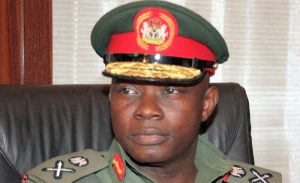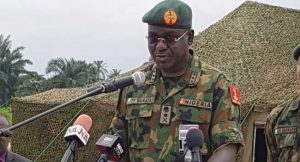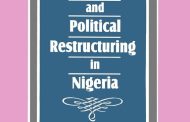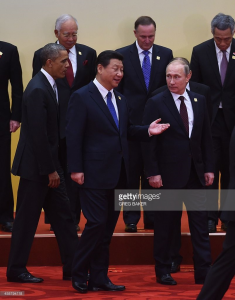When the American troops eventually landed in Iraq in 2003 for the ground duel, they did not find the Iraqi troops the way they expected. The troops had literarily sunk itself, disappeared. It must have puzzled the Americans but they went on with the task at hand, except that it did not take the Iraqi troops too long to re-appear. When they did, it turned the war into the classic of the postmodern war: the war involving no centre of gravity, no clear ‘enemies’ that stood distinctly from the crowd. They were everywhere but nowhere, lost in the crowd. The war had to be reworked into one involving “commanders” (community and religious leaders) that had nothing to do with any military orientation whatsoever.

Gen Olonisakin, immediate past Chief of Defence Staff
Reference to the American experience in Iraq is warranted by what Gen Abayomi Olonisakin and Tukur Buratai have been telling the National Assembly about Nigeria’s current crisis. The two submitted a thesis that can be christened the forest theory of the current crisis. Theories do not necessarily have to coached in high flown academe.
Their theory, propounded separately before the National Assembly, is that Nigeria has lost her forests to insurgents or bandits or whatever one chooses to call them. This is what General Olonisakin said he found out through research three years ago. Gen Buratai who did not say when he found this out is, however, sure it will take another 20 years to liberate the forests from the occupying bands. He was also generous enough to add that the process of routing the occupiers extends beyond what coercion can achieve but undercutting the hold of the bandits on local communities through the spreading of developmental attractions. This is because the insurgents have diffused into local communities and even won them to their sides.
There is no such thing as a correct or incorrect theory. A theory remains a theory but a theory is not privileged from interrogation. A few observations, comments and suggestions can, therefore, be made about this interesting theory by the two gallant proponents.
One is that it can be inferred from the theory that Nigeria is facing nearly the same experience of the Americans in Iraq, the only difference being that it was not on American soil. But, even if this is true, there is a disturbing silence somewhere which might have arisen from either the media not reporting that aspect of Buratai’s forest theory or the theorist themselves did not expatiate and/or nobody asked him. Nowhere in the media reports so far did the ambassadors to-be hint about where the insurgents came from. Could they have come from Boko Haram sinking itself in the aftermath of their dislodgment from Sambissa Forest, relocating into the different forests across the country or are the occupying insurgents the ones that the APC is said to have imported to ‘assist’ it win the 2015 presidential election or might they be the renegade fighters from Libya President Buhari advances or are they the angry Fulani youths who have found strength in AK-47? Or are the occupiers a mixture of all these? That’s the question no one is answering.
That Boko Haram ‘disappeared’ from the forest has been hinted many times. In fact, what a judge once said is that Nigeria would regret the storming of Sambissa Forest, that the president had been deceived. This statement was coming shortly after the exercise. Interestingly, the two retired Generals and the Ooni of Ife are speaking the same language. The Ooni had said during a previous visit to the Villa last year that strange, armed faces had taken over forests in Yorubaland.
But these are all hints. Up till this moment, no one has told the nation officially who the occupiers are even though, right from Day 1, each and every member of the elite knew what went wrong. But, no fraction has been honest enough to speak up, win over the nation to its position and make a national mobilisation against the stalemate possible. Neither the intellectuals, politicians, the military nor the business fractions have been able to do this. Everyone is rather running to his or her local platform, massing up local militias, thinking they will find security there, oblivious of the form wars have taken in the 21st century.
It is the sort of deliberate “ignorance” that is misleading people to think that they can easily turn their ethnic or local space into a republic by cutting off from Nigeria. They will be walking straight into multiple insurgencies and militias. War too has changed. The old boundaries have disappeared and no part of the world is immune to the consequences of de-territorialisation.

Gen Buratai, immediate past COAS
If the comparison with the American experience in Iraq is correct, then Nigeria is simply confronting a classic 4th Generation war or Diffuse War or the postmodern war. Why is neither Olonisakin nor Buratai suggesting stepping up mobilisation of the country against the occupation as a solution? Instead, Buratai in particular, was talking about a 20 year span for this to be overcome. Why should it take 20 years when the populace can be re-mobilised in no time? And, if the Nigerian defence establishment does not believe in a people’s approach as magic pill in counter-insurgency, what of the Sultan’s moral marching order to them to retake the forests?
What might have come over the Nigerian elite in allowing things degenerate to a Babel of interpretations with imponderable consequences? Once again, Intervention reproduces the diverse standpoints in this synthesis:
- The earliest position must be the one by Nasir el-Rufai, the governor of Kaduna State. He said the problem was coming from those who had a raw deal in terms of loss of cattle during the 2011 post election violence and that they had reached out and paid ‘compensation’ to them to stop it. An amended version of the statement surfaced later which linked the payment to what the late Patrick Yakowa was said to have been doing as governor of Kaduna State.
- The second must be President Buhari’s intervention, describing the cleansing squad as renegade fighters from Libya. An April 12th, 2018 report by Premium Times quotes the president as telling Justin Welby, the Archbishop of Canterbury in London that the security situation in Nigeria had been made worse by arms the former Libyan leader provided to his supporters but which had filtered into Nigeria and are being used for the killings across the north-central. “These gunmen were trained and armed by Muammar Gaddafi of Libya. When he was killed, the gunmen escaped with their arms. We encountered some of them fighting with Boko Haram”, he added, contrasting the herdsmen he used to know who never carried anything beyond sticks and probably cutlass. This was the point he restated in a June 27th, 2018 CNN report which quoted him as saying ”…The present herder, I am told, carries AK47 and people are even blaming me for not talking to them because maybe (they say) I look like one of them. There is some injustice in these aspersions,’
- The Sultan of Sokoto has been speaking. Each time he always said it is not a case of Fulanis but of criminality and which should be dealt with as such. In other words, his own theory of the crisis is state incoherence
- It was in-between the president’s denials between April and June 2018 that General TY Danjuma came up with the claim of complicity of the Armed Forces, saying the armed forces now “collude with armed bandits” to attack innocent Nigerians” and that the way out is for popular self-help or they risk dying, “ one by one”. He was sure that Somalia would be Nigeria’s fate if there was no change of mind away from the perceived complicity of the military.
- Out-gone US president, Donald Trump added his own voice during a Buhari visit to Washington in April 2018 to stop the killing of Christians. The Nigerian president was to say later he was so caught off guard by that he did not reply Donald Trump
- Governor Ortom of Benue State articulated his own version too in the theory armed herdsmen incursions as a land acquisition and Islamisation project. Speaking while delivering the Professor Miriam Ikejiani-Clark Lecture at the University of Nigeria, Nsukka, (UNN), May 2019, the governor predicted spreading of the menace towards the Southwest and the risk of becoming “an obvious national social and economic problem too difficult to contain”. “Those who think that the problem of herdsmen is only that of Benue valley and Middle Belt states should watch out. It was first with Plateau State and southern Kaduna and then Taraba, Adamawa, Niger, Kogi, Nasarawa, Delta, Cross River, Ekiti, Ebonyi, Enugu, Zamfara, Katsina, Rivers, Ogun, Ondo and other states”. Today, Ortom would say he got it right.
- Chief Olusegun Obasanjo unfolded his own theory of the crisis as something beyond lack of education or jobs but an agenda of “Fulanisation of West Africa, Islamisation of Africa and global organised crime of human trafficking, money laundering, drug trafficking, illegal mining and regime change”. Interestingly, Obasanjo and Ortom were speaking in the same month but saying very different things on issues in which both enjoy the status of ‘hierarchy of credibility’.
- Lagos State University, (LASU) academic, Prof Sylvester Odion-Akhaine pushes the argument that the trouble with Nigeria or the primary contradiction now is the nationality question, arguing that what is happening to Nigeria is how, along the line, one nationality has, by its domination of the rest, subverted the nationhood project. In his own words, the country is dealing with a state-nation problem, defined as the phenomenon in which a minority nationality has assumed control of the material forces the state, essentially the security forces. He goes on to argue how this minority, “by the fact of that dominance, has mainstreamed its own identity over the rest in terms of leveraging on that control”
- In June 2020, Col Abubakar Dangiwa Umar (rtd) advanced the theory of President Buhari’s nepotism as the source and nature of the problem, warning that the Buhari’s nepotism is what is pushing the country to the brinks.
- In late 2020, Bishop Mathew Hassan Kukah asked if there isn’t a sinister plan going or gone awry, as could be seen in the contradiction involving the spread of the violence in the Northwest where the president comes from.
- Kawu Barage, a leading politician, sees all that has been happening from the point of view of blow back. The Fulani militia in question, he said while marking his 70th birthday in Ilorin, were imported into the country to ensure victory of the ruling APC in 2015. They came from Mali, Chad, Sierra Leone, Senegal and Niger Republic, he told Nigerians on February 4th, 2021, insisting that the right questions were not being asked.
- But, barely had he finished speaking did Sheikh Ahmad Gumi come up with a theory of the crisis as the reaction of herdsmen against neglect, military highhandedness and exclusion. He said so after meeting them in their turf
- The last theorist on the matter so far is Governor Bala Mohammed of Bauchi State who tells us it is all about self-defence by herdsmen who have discovered they needed AK47 because men have learnt how to get at them and their cattle without missing.




























